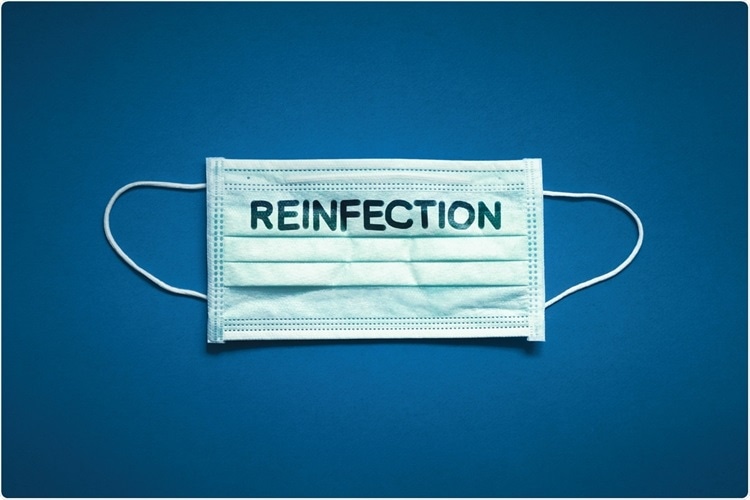RIO DE JANEIRO, BRAZIL – Vaccines have high protective efficacy against infection or reinfection with the severe acute respiratory syndrome coronavirus 2 (SARS-CoV-2), the causative agent of the coronavirus disease 2019 (Covid-19) pandemic.
A new review available on the medRxiv* preprint server showed that the protective effect of prior SARS-CoV-2 infection is at least equivalent to that of vaccination.

BACKGROUND
The researchers carried out a systematic review of all studies that mentioned reinfection with SARS-CoV-2. Immunity following natural infection has been highlighted in a variety of viral diseases. It is, in fact, responsible for the decline of most epidemics after a majority of susceptible hosts have been infected.
While early research indicated that SARS-CoV-2 did induce potent immunity, its extent and magnitude remained to be characterized. Epidemiologic findings indicated that seropositive individuals are unlikely to be reinfected.
In addition, seronegative individuals are protected from 80% of reinfections if they have previously experienced an infection compared to previously uninfected individuals.
One study has demonstrated a 0.7% risk of reinfection among 10,000 cases, while others found that 0.03% and 0.01% of those with prior infection required hospitalization, or had a fatal outcome, respectively.
Another interesting study showed that having been infected with the virus is at least as strong a protective factor against reinfection as vaccination, looking at laboratory staff tested daily for the infection.
The current study aimed to compare immunity rates among individuals with a history of prior infection vs. those without immunity. This is important in the context of increasing rates of infection, even as vaccines are being rolled out.
WHAT DID THE STUDY SHOW?
Following a review of the literature that followed PRISMA guidelines, the researchers found that the risk of reinfection was reduced by 90% compared to those who were naïve for the virus. This protection was sustained for up to ten months.
The findings corroborated earlier studies that show how durable the level of protection conferred by earlier infections is in preventing reinfection, similar to those who had been vaccinated.
Other researchers have found that both humoral and cellular immunity remain active for ten months or even more. These studies covered a range of countries with different age groups and regional coverage.
Despite the many differences in the cohorts included, the conclusion in all cases was that the risk of reinfection was very low after recovering from an earlier infection or following vaccination.
WHAT ARE THE IMPLICATIONS?
The scientists concluded that the protective effect provided by prior SARS-CoV-2 infection on reinfection is of the same protective effect as vaccination or even higher.
In the current pandemic conditions, it is essential to avoid large surges in infections to prevent the emergence of new variants with potentially greater transmissibility and resistance to neutralization by the antibodies raised against earlier strains.
The first-generation vaccines developed on several platforms have focused on either expressing or introducing the viral spike protein into the recipient’s body. The efficacy of such vaccines has been especially high against symptomatic and severe disease and death following SARS-CoV-2 infection.
However, such protection is challenged by the newer variants such as the alpha, the delta, and the beta strains.
The alpha and delta strains rapidly rose to become the dominant strains in the second and succeeding waves. Both are associated with significantly higher transmissibility, and the latter may also have partial immune escape capability, as does the beta variant. This has led to a possible reduction in vaccine efficacy, though vaccines continue to drive down the number of symptomatic infections worldwide.
This study shows that prior infection with or without seropositivity can provide immunity against reinfection with another virus variant. However, the researchers point out that the studies reviewed here may have suffered from multiple sources of bias.
The findings correlate well with other serologic studies showing that seropositivity was linked to a lower reinfection rate than the rest of the population. It should be noted that both the current review and the serologic studies are based on the earlier period of the pandemic when the wildtype or Wuhan strain was prevalent, and reinfections would have been caused largely by this variant.
At present, with competing strains that are more transmissible and capable of evading antibody-mediated immunity, the reinfection profile may be different. Ultimately, more research must follow this study to characterize protective effects against different SARS-CoV-2 strains.
*Important notice
medRxiv publishes preliminary scientific reports that are not peer-reviewed and, therefore, should not be regarded as conclusive, guide clinical practice/health-related behavior, or treated as established information.
Source: News Medical

